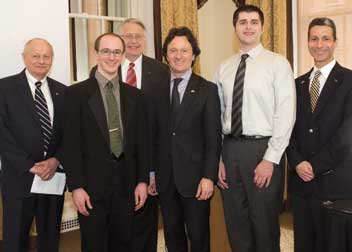Pitt Undergrads Triumph in National Green Idea Competition Hosted by German Embassy
 Deputy Consul General Oliver Schnakenberg of the Consulate General of Germany in New York visited the University March 14 to present awards to Pitt’s two winning teams in the German Embassy’s green ideas competition. From left, George Klinzing, Pitt vice provost for research; Chris Rovensky, Pitt chemical and petroleum engineering student; David Murdoch, the honorary German Consul in Pittsburgh; Schnakenberg; Adam Sparacino, Pitt electrical and computer engineering student; and Gregory Reed, a Pitt professor of electrical and computer engineering and director of Pitt’s Power and Energy Initiative.
Deputy Consul General Oliver Schnakenberg of the Consulate General of Germany in New York visited the University March 14 to present awards to Pitt’s two winning teams in the German Embassy’s green ideas competition. From left, George Klinzing, Pitt vice provost for research; Chris Rovensky, Pitt chemical and petroleum engineering student; David Murdoch, the honorary German Consul in Pittsburgh; Schnakenberg; Adam Sparacino, Pitt electrical and computer engineering student; and Gregory Reed, a Pitt professor of electrical and computer engineering and director of Pitt’s Power and Energy Initiative.Pitt undergraduate researchers emerged triumphant in a nationwide green ideas competition hosted by the German Embassy in Washington, D.C., finishing first in two of the contest’s three categories. The winning students receive a free trip to Berlin.
The Pitt students competed against young researchers from 17 other American universities who submitted videos addressing issues related to energy and the environment for the 2010 Our Choices Matter contests. The contests were sponsored by the Transatlantic Climate Bridge Initiative, a program designed to foster German-U.S. cooperation on environmental and energy concerns. Students at the participating universities first competed against peer teams within their own respective schools; the Pitt symposium was hosted by the University’s Center for Energy and Office of the Provost. The school-level winners then went on to compete nationwide in three categories: Green Shot, Change Your Neighborhood, and Green Energy Alternatives Debate.
Pitt Swanson School of Engineering students Ansel Barchowsky (electrical and computer engineering), Chris Lippert (mechanical engineering and materials science), and Adam Sparacino (electrical and computer engineering) won first prize in the Green Shot competition for their video examining the current development of a more efficient and user-friendly “smart” electric power grid. Recognized for its breadth, the team’s project covered the more practical and efficient steps being taken to improve the electric grid, as well as gaps in the existing technology and standards. The group was mentored by Gregory Reed, a Pitt professor of electrical and computer engineering and director of the Swanson School’s Power and Energy Initiative.
In the Change Your Neighborhood category, Pitt chemical and petroleum engineering student Chris Rovensky took first place for presenting his project to decontaminate and reclaim brownfields and other marginal land by planting biofuel crops. The crops would at once improve soil conditions, fill vacant urban lots, and provide alternatives to fossil fuel. The project is being led by Rovensky’s faculty mentors Amy Landis and Jason Monnell, professors of civil and environmental engineering in the Swanson School.
A group of Pitt students mentored by Pitt chemistry professor Joseph Grabowski received honorable mention in the Green Energy Alternatives Debate category for surveying alternative energy sources available to the modern consumer.
The video submissions from all three Pitt teams are available on the German Embassy Web site at http://bit.ly/fvWo0j.
Other Stories From This Issue
On the Freedom Road

Follow a group of Pitt students on the Returning to the Roots of Civil Rights bus tour, a nine-day, 2,300-mile journey crisscrossing five states.
Day 1: The Awakening
Day 2: Deep Impressions
Day 3: Music, Montgomery, and More
Day 4: Looking Back, Looking Forward
Day 5: Learning to Remember
Day 6: The Mountaintop
Day 7: Slavery and Beyond
Day 8: Lessons to Bring Home
Day 9: Final Lessons

